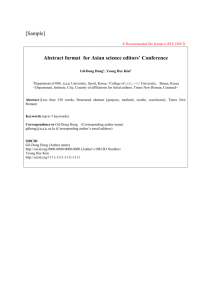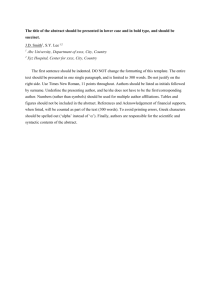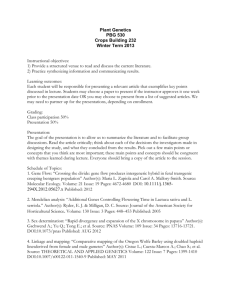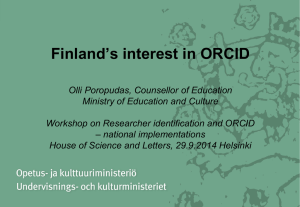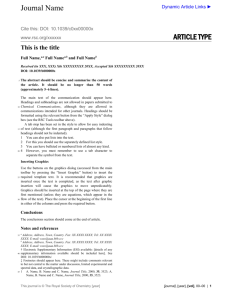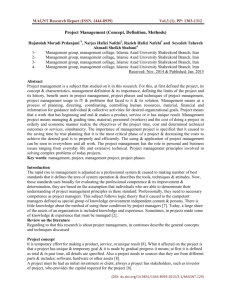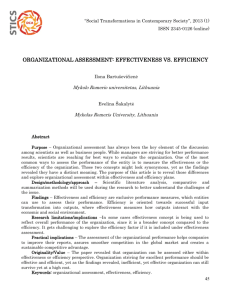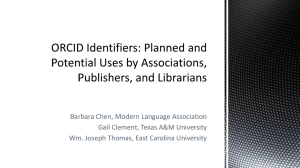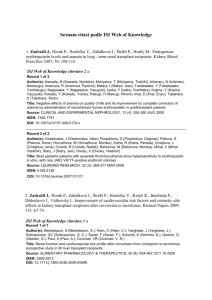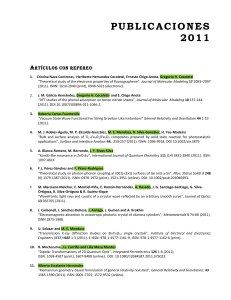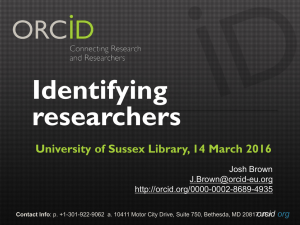REM_template_v.1.0
advertisement
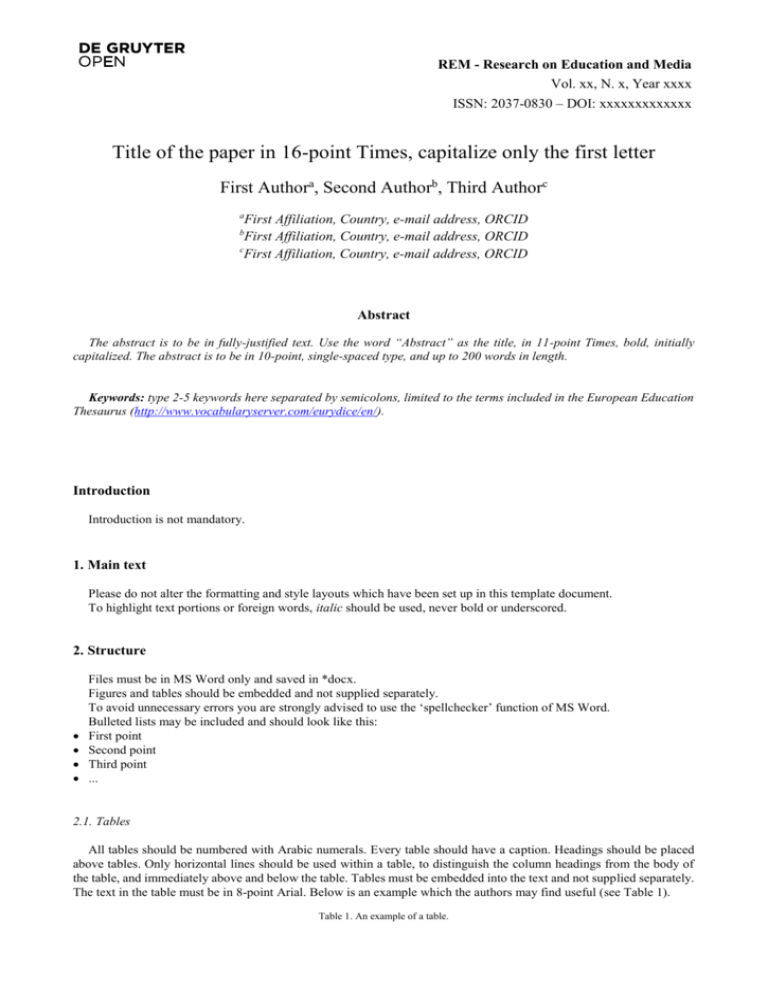
REM - Research on Education and Media Vol. xx, N. x, Year xxxx ISSN: 2037-0830 – DOI: xxxxxxxxxxxxx Title of the paper in 16-point Times, capitalize only the first letter First Authora, Second Authorb, Third Authorc a First Affiliation, Country, e-mail address, ORCID First Affiliation, Country, e-mail address, ORCID c First Affiliation, Country, e-mail address, ORCID b Abstract The abstract is to be in fully-justified text. Use the word “Abstract” as the title, in 11-point Times, bold, initially capitalized. The abstract is to be in 10-point, single-spaced type, and up to 200 words in length. Keywords: type 2-5 keywords here separated by semicolons, limited to the terms included in the European Education Thesaurus (http://www.vocabularyserver.com/eurydice/en/). Introduction Introduction is not mandatory. 1. Main text Please do not alter the formatting and style layouts which have been set up in this template document. To highlight text portions or foreign words, italic should be used, never bold or underscored. 2. Structure Files must be in MS Word only and saved in *docx. Figures and tables should be embedded and not supplied separately. To avoid unnecessary errors you are strongly advised to use the ‘spellchecker’ function of MS Word. Bulleted lists may be included and should look like this: First point Second point Third point ... 2.1. Tables All tables should be numbered with Arabic numerals. Every table should have a caption. Headings should be placed above tables. Only horizontal lines should be used within a table, to distinguish the column headings from the body of the table, and immediately above and below the table. Tables must be embedded into the text and not supplied separately. The text in the table must be in 8-point Arial. Below is an example which the authors may find useful (see Table 1). Table 1. An example of a table. Title of the article authors An example of a column heading Column A (t) Column B (t) And an entry 1 2 And another entry 3 4 And another entry 5 6 2.2. Construction of references References must be listed at the end of the paper. Do not begin them on a new page unless this is absolutely necessary. Authors should ensure that every reference in the text appears in the list of references and vice versa. Quoted text from sources listed in the bibliography should follow the APA rules, such as in the following examples: (Bruner, 1986); or (Bruner, 1986, p. 11); or (Bruner, 1986, pp. 11-12); or (Tufte, Rasmussen & Christensen, 2005); or (Mayer et al., 2005), or (Ardizzone & Rivoltella, 2003). Some examples of how your references should be done are given at the end of this template in the ‘References’ section. 2.3. Footnotes Footnotes, if any, should be progressively numbered, and should have only an explanatory function (no bibliographical notes). Necessary footnotes should be denoted in the text by consecutive superscript numbers1. The footnotes should be typed single spaced and in smaller type size (8 pt), at the foot of the page in which they are mentioned. 3. Iconographic documentation Figures, pictures, graphs and other documents to be included as originals should be provided in original form (no photocopies); images extracted by newspapers or other low-quality sources should be avoided. Digital images should conform to these characteristics: line drawings (in black and white) 600 to 1200 dpi resolution; grayscale images 300 dpi resolution; in any case the images, as also the tables, must be referred to in the body of the main text, provided with legends and progressively numbered. The figure number and caption should be typed below the illustration in 8-point Times (see Fig. 1). The editorial board reserves the right of slightly modifying the placement of images for printing purposes. As images are often copyrighted, it will be the author(s) responsibility to acquire written permission to reproduce both images and material which is part of previous publications, or not owned by them. In the case of pictures portraying people, the author(s) will have to obtain publication permission from the subject(s). Fig. 1 Picture. Conclusions Not mandatory. 1 Footnote text. REM - Research on Education and Media. Vol. xx, N. x, Year xxxx - ISSN: 2037-0830 Title of the article authors References Quoted texts must be listed in bibliography following strictly the standards set by APA Publication Manual (http://www.apastyle.org/), by alphabetic order of author's names, and in chronological order (from the oldest to the most recent publication) where works by the same author are concerned. Depending on the kind of work quoted, bibliographical reference should strictly follow these models: a) Journal articles: Messina, L. (2007). Valutazione dei prodotti mediali: il “collaudo” di Gnam! Il cibo in gioco, CADMO, XV(1), 87-114. b) Journal Articles in Press: Ricciardi, M., & Bossi, V. (in press). Convergenza tecnologica e creatività digitale. Economia dei servizi. c) Article From an Online Periodical with DOI Assigned: Wooldridge, M.B., & Shapka, J. (2012). Playing with technology: Mother-toddler interaction scores lower during play with electronic toys. Journal of Applied Developmental Psychology, 33(5), 211-218. http://dx.doi.org/10.1016/j.appdev.2012.05.005 d) Article From an Online Periodical with no DOI Assigned: Author, A. A., & Author, B. B. (Date of publication). Title of article. Title of Journal, volume number. Retrieved from http://www.journalhomepage.com/full/url/ e) Books: Rivoltella, P.C. (2006). Screen generation. Milano: Vita e Pensiero. f) Books «edited by»: Ricciardi, M. (Ed.) (2008). Interfacce della memoria. Napoli: ScriptaWeb. Rivoltella, P.C. (Ed.) (2008). Digital literacy: Tools and methodologies for information society. Hershey: IGI. g) Contributions to a collection or anthology: Limone, P. (2006). Videogiochi e pedagogia. Training level ed applicazioni didattiche. In T. Grange-Sergi, & M.G. Onorati (Eds.), La sfida della comunicazione all’educazione. Prospettive di media education (pp. 129-142). Milano: Franco Angeli. h) Congress papers: Galliani, L., & De Waal, P. (2005, June), Learning face to face, in action and on line: Integrating model of lifelong learning. Paper presented at Eden Annual Conference, Bringing e-learning close to lifelong learning and working life: A new period of uptake, Finland, Helsinki. Messina, L., Personeni, F., Tabone, S., & Manfio, S. (2008). Lello & Lella international research project. In L. Gómez Chova, D. Martí Belenguer, & I. Candel Torres (Eds.), INTED2008 Proceedings. International Technology, Education and Development Conference (pp. 216-224). Valencia: IATED. i) Quotes from web sites: Rivoltella, P.C. (2006). Media Education e http://www.ilmediario.it/cont/articolo.php?articolo=313&canale=Terza&nav=1 ricerca. REM - Research on Education and Media. Vol. xx, N. x, Year xxxx - ISSN: 2037-0830 Retrieved from

